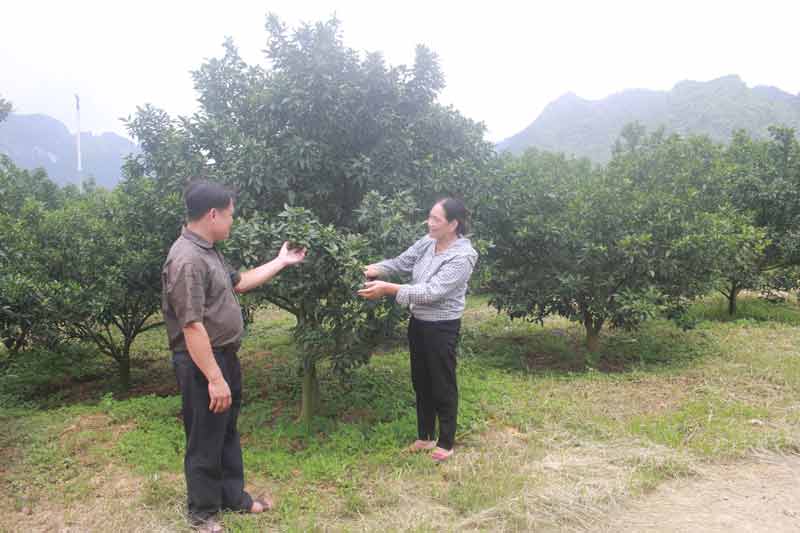
(HBO) – The Party Committee of Lien Hoa commune, Lac Thuy district, northwestern Hoa Binh province, is focusing on helping locals develop economy and improve living standards. Based on the natural conditions, the communal authorities have encouraged people to actively shift to growing citrus fruits with high economic value, especially oranges.
 The six-hectare orange and grapefruit garden of family of Ms.
Do Thi Thuong (R), head of Dong Huong hamlet, Lien Hoa commune (Lac Thuy),
Party member pioneering in changing of local crops for stable income.
The six-hectare orange and grapefruit garden of family of Ms.
Do Thi Thuong (R), head of Dong Huong hamlet, Lien Hoa commune (Lac Thuy),
Party member pioneering in changing of local crops for stable income.
The commune has four hamlets, 450 households,
and 1,830 people. Previously, its economy mainly came from forestry with the
dominance of acacia trees. However, due to low economic efficiency, the
communal authorities had a policy of encouraging people to convert the
ineffective acacia growing area to citrus including orange and grapefruit. As a
result, the area under citrus has trees strongly increased to 220 hectares at
present from 60 hectares in 2014, including 200 hectares of oranges and 24.5
hectares of grapefruits.
Mr. Bui The Thao, permanent vice secretary of
the Party Committee of Lien Hoa commune, said a symposium is held annually to
put forth long-term solutions to developing citrus fruits in the locality,
especially oranges. Party members are encouraged to promote their pioneering
role in the field. Ms. Do Thi Thuong, head of Dong Huong commune, is one of the
active members.
Lac Thuy orange brand was recognised in 2017 and
Lien Hoa is one of the largest producers. Lac Thuy orange is characterized with
thin and shiny skin, big seeds, fragrant, sweet and succulent taste. Orange
products are sold to other localities such as Ha Nam, Ninh Binh, Thanh Hoa and
Hanoi. Thanks to this fruit, the average per capita income of Lien Hoa commune
has increased to 35.2 million VND (1,513 USD) per year, and the rate of poor
households has been reduced to 6.6 percent./.
In the spirit of "Party members go first, the people follow”, all households of Party members in the Doan Ket sub-region in Da Bac town, Da Bac district, voluntarily removed gates and fences, and donated land when the road expansion project passed through their properties. Inspired by their example, 68 households in the sub-region quickly followed suit, contributing over 1,400 sq.m of residential and perennial cropland to widen the main road through the residential area. The exemplary role of Party members in Doan Ket stands as a shining example of studying and following President Ho Chi Minh’s thought, morality, and lifestyle.
The Hoa Binh provincial People's Committee held a monthly meeting on May 29 to assess the implementation of socio-economic development tasks in the first six months of 2025, the progress of key projects, and some other important issues.
During his lifetime, President Ho Chi Minh always expressed his deep affection and special concern for children and youth. He once emphasized: "Caring for and educating children well is the responsibility of the entire Party and the entire people”; "First of all, the family (i.e. grandparents, parents, siblings) must do this job well”. "the Party Committees…, the Children’s Committee, the Youth Union, the education sector, and all related organizations must have specific plans to ensure children grow healthier and more progressive”. His teachings has been remaining valuable and serving as the guiding principles in the work of protecting, caring for, and educating children. In line with this ideology, Hoa Binh Province has continuously been prioritizing and investing resources in the well-being of children in recent years.
Mr. Nguyen Phi Long, the alternate Member of the Party Central Committee and Secretary of the Provincial Party Committee chaired the meeting of the Standing Committee of the Provincial Party Committee to provide opinions on several investment projects within the province. There was the attendance of Ms. Bui Thi Minh, the Permanent Deputy Secretary of the Provincial Party Committee and Chairwoman of the Provincial People’s Council; Mr. Bui Đuc Hinh, the Deputy Secretary of the Provincial Party Committee and Chairman of the Provincial People’s Committee and other members of the Standing Committee; the leaders from other departments, agencies, and some localities.
The Standing Board of the Vietnam Fatherland Front (VFF) Committee of Hoa Binh province held a meeting on May 28 to honour outstanding village elders, village heads, and reputable individuals from local ethnic minority and religious communities.
In mid-May, the provincial Museum organised an exhibition named "Duoi la co Dang Cong san Viet Nam quang vinh” (Under the flag of the glorious Communist Party of Vietnam). This meaningful activity took place in the joyful atmosphere to celebrate the country's major holidays and the Party congresses at all levels for the 2025-2030 term, towards the 14th National Party Congress.



 The six-hectare orange and grapefruit garden of family of Ms.
Do Thi Thuong (R), head of Dong Huong hamlet, Lien Hoa commune (Lac Thuy),
Party member pioneering in changing of local crops for stable income.
The six-hectare orange and grapefruit garden of family of Ms.
Do Thi Thuong (R), head of Dong Huong hamlet, Lien Hoa commune (Lac Thuy),
Party member pioneering in changing of local crops for stable income.